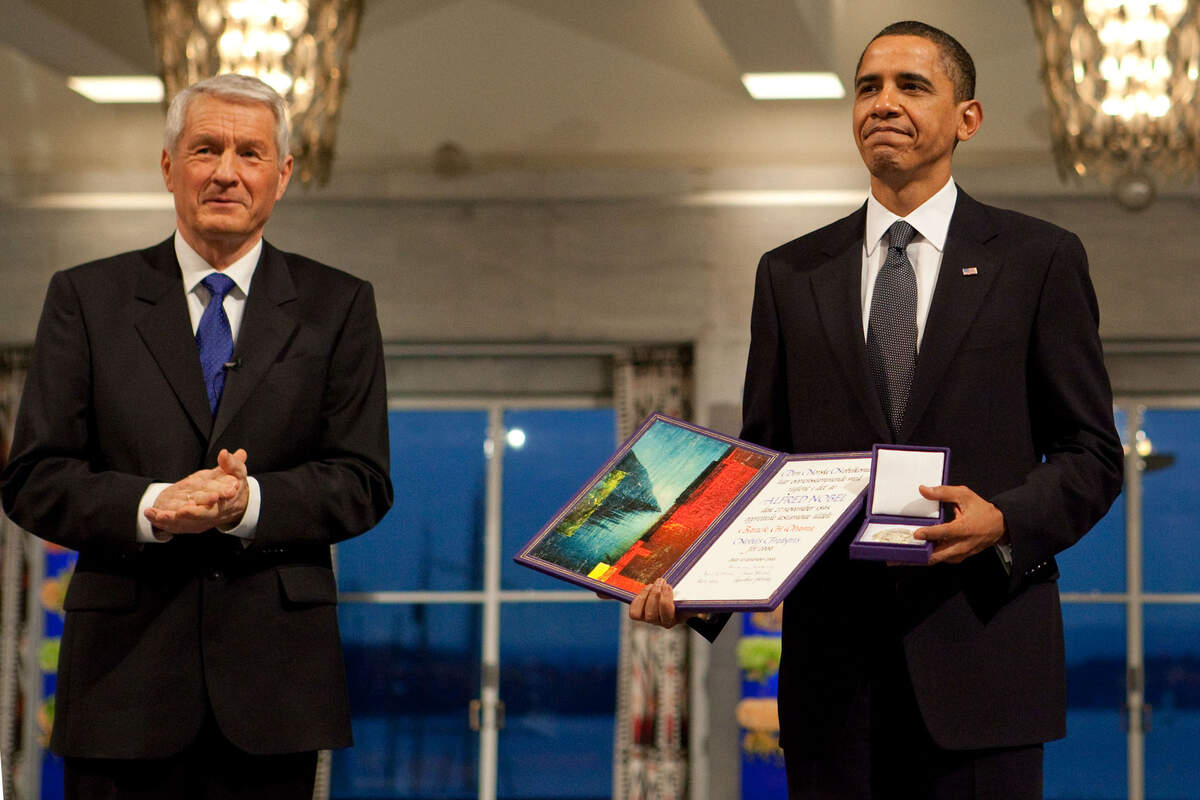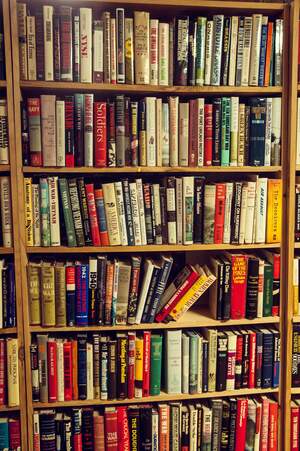

Nobel Prize Day
The Nobel Prizes, considered by many to be the most prestigious awards in the world, are conferred today at the Nobel Prize Award Ceremonies, on what is known as Nobel Prize Day or The Nobel Day. Nobel Prizes are given out in physics, chemistry, physiology or medicine, literature, economics, and peace. All but the prize in economics were stipulated in Alfred Nobel's will and began being awarded in 1901. The economics prize, known officially as the Sveriges Riksbank Prize in Economic Sciences in Memory of Alfred Nobel, began being awarded in 1969. It technically is not a Nobel Prize but is associated with them. All of the prizes must be awarded to individuals, except for the Nobel Peace Prize, which can be awarded to an institution or an individual. Nobel Prizes can be awarded to one person or can be shared by two or three people.
Nobel wrote in his will, which he signed in November 1895:
All of my remaining realisable assets are to be disbursed as follows: the capital, converted to safe securities by my executors, is to constitute a fund, the interest on which is to be distributed annually as prizes to those who, during the preceding year, have conferred the greatest benefit to humankind. The interest is to be divided into five equal parts and distributed as follows: one part to the person who made the most important discovery or invention in the field of physics; one part to the person who made the most important chemical discovery or improvement; one part to the person who made the most important discovery within the domain of physiology or medicine; one part to the person who, in the field of literature, produced the most outstanding work in an idealistic direction; and one part to the person who has done the most or best to advance fellowship among nations, the abolition or reduction of standing armies, and the establishment and promotion of peace congresses.
When Alfred Nobel died on December 10, 1896, the date on which Nobel Prize Day is held, he left SEK 31 million for the Nobel fund. In doing so, Nobel gave away much of his wealth. The Nobel Foundation was established to carry out the wishes of the will, give out prizes, and administer funds. Nobel's family was opposed to the establishment of the Nobel Prize, and it took five years for the first prizes to be given out. The first Nobel Prize Day was on December 10, 1901.
Based in Sweden, The Royal Swedish Academy of Sciences confers the physics, chemistry, and economics prizes, the Karolinska Institute confers the physiology or medicine prize, and the Swedish Academy confers the literature prize. In Oslo, Norway, the Norewegian Nobel Committee confers the prize for peace. There are usually about 100 to 250 nominees for Nobel Prizes each year, and about 1000 people submit nominations for each prize. Those behind the nominations include Nobel laureates, members of the institutions that are awarding the prizes, scholars in the fields at hand, and members of learned societies and universities. Nobel Committees, one for each of the prizes, receive nomination proposals by January 31, and they come up with recommendations which they submit to the institutions that award the prizes. The laureates are announced in early October.
Alfred Nobel designated the scientific prizes to be given out in Stockholm, Sweden, and the Nobel Peace Prize to be given out in Oslo, Norway. (Sweden and Norway were united at the time.) From 1901 to 1925, the scientific prizes were given out at the Old Royal Academy of Music, and on most years since—with a few exceptions—the prizes have been given out at the Stockholm Concert Hall. Laureates receive the Nobel Prize medal and a diploma from the King of Sweden, as well as a sum of money. Following the ceremony, the Nobel Banquet is held in the Blue Hall in Stockholm City Hall. In Oslo, the laureates receive the Nobel Peace Prize from the Chairman of the Norwegian Nobel Committee, with the King of Norway present. The prize has been given out at a few locations over the years, but since 1990 it has been given at Oslo City Hall.
Various events related to the day take place around the same time as it. Press conferences and seminars are held, and the laureates give lectures. The Nobel Prize Series, Nobel Week Dialogue, Nobel Prize Dialogue, Nobel Prize Forum, and the Nobel Prize Inspiration Initiative are held. The Nobel Prize Concert is held at the Stockholm Concert Hall in honor of the laureates.
Alfred Nobel was born on October 21, 1833, in Stockholm, Sweden. Besides establishing the Nobel Prizes, he wrote drama and poetry, had an interest in social and peace issues, was fluent in multiple languages, and was an inventor and industrialist, with his most noteworthy invention being dynamite. He learned five languages by the age of 17 and took an interest in English poetry and literature in his youth, as well as in chemistry and physics. His father sent him for training in chemical engineering, and he traveled to Germany, the United States, and France during this time.
In France, he worked in the lab of the famous chemist Professor T.J. Pelouze, where he met Ascanio Sobrero, who had synthesized nitroglycerine three years prior. Nobel became interested in the liquid and how it could be put to practical use, to be used in construction work. Nobel left for St. Petersburg in 1852 to help with the family business, which was booming on account of the Crimean War. His father, Immanuel, was the inventor of a type of naval mine, which was made of wooden casks containing gunpowder, that Russia was using during the war. While there, he worked with his father to test nitroglycerine as a useful explosive. The Crimean War ended in 1856. Nobel, his father, and one of his brothers, Emil, returned to Stockholm in 1863. They continued working with nitroglycerine, which sometimes brought tragedy. Some people were killed during explosion tests, including Emil in 1864.
Testing was banned within the Stockholm city limits, so Nobel moved his operation outside of it, to a barge on nearby Lake Mälaren. He discovered he could turn nitroglycerine into a paste by mixing it with diatomaceous earth, which enabled it to be shaped into rods that could be placed in drilling holes. He patented his invention as dynamite in 1867, and also invented a detonator, the blasting cap, which was attached to a fuse that could be lit. Dynamite helped reduce the cost of construction work, like building canals, drilling tunnels, and blasting tunnels. It was first used on a large scale with the building of the St. Gotthard Tunnel in the Swiss Alps, which was completed in 1881.
Nobel eventually had factories and laboratories in about 90 locations in over 20 countries. He continued work on other chemical inventions and explosives technology and had 355 patents under his name when he died. But Nobel's greatest legacy is what he left behind in his will: the creation of the Nobel Prizes. As he was interested in social issues and issues related to peace, poetry and dramatic works, and sciences, the Nobel Prizes reflect these interests. On Nobel Prize Day, the Nobel Prize Award Ceremonies are held, where the Nobel Prizes are given to laureates being honored in their respective fields.
How to Observe Nobel Prize Day
Here are some ways you could observe the day:
- Watch the Nobel Prize Award Ceremonies on television or watch ceremonies from previous years.
- Visit the Nobel Prize Museum in Stockholm or the Nobel Peace Center in Oslo.
- Attend a Nobel Prize event, many of which take part around the time of Nobel Prize Day, such as the Nobel Week Dialogue, the Nobel Prize Dialogue, the Nobel Prize Series, the Nobel Prize Inspiration Initiative, or the Nobel Peace Prize Forum.
- Read Alfred Nobel's will.
- Explore past Nobel Banquet menus.
- Watch a documentary inspired by the Nobel Peace Prize.
- If you are an educator, use lessons related to the Nobel Prizes.
- Explore the Nobel Prize nomination archive.
- Visit Alfred Nobel's home in Paris or Italy.





















